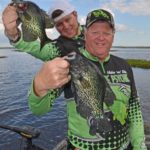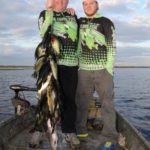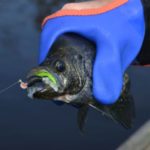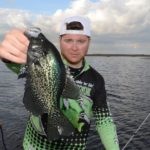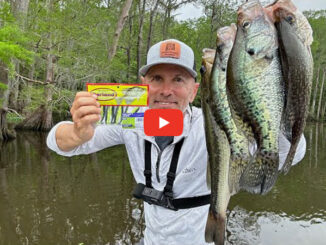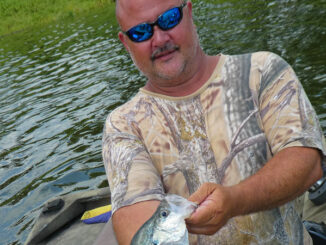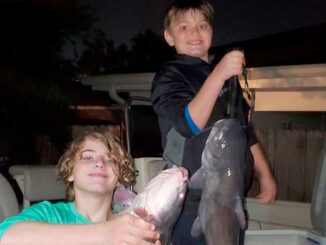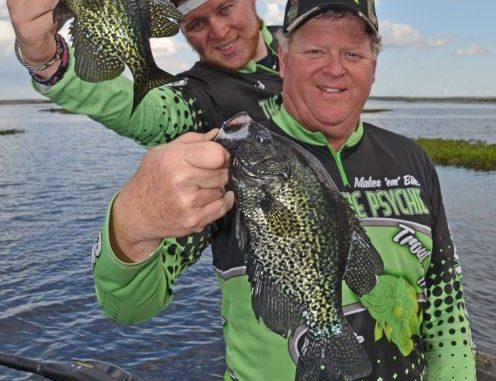
If crappie fishing fills your nighttime thoughts, this angler has the tips and tools to help turn dreams into reality.
His son dubbed Clyde Folse “The Crappie Psychic.” But I believe he’s a crappie dreamer, kind of like an Indian shaman who can divine the future concerning this silver-and-black speckled fish, variously called sac-a-lait or white perch in Louisiana.
It’s all he wants to talk about: crappie, crappie, crappie.
Oh yes, and his Crappie Psychic Crappie Trailer — how could I forget that?
I first met Folse at the Louisiana Sportsman’s Show, the massive outdoors extravaganza held in Gonzales each spring. I eavesdropped while he was yakking with a fisherman who stopped at his booth.
With the sincerity of a country preacher but his blue eyes twinkling, he admitted his obsession with crappie.
“I’m a sac-a-lait guy. That’s all I want to fish,” Folse said. “If I get on a bed of bream, I leave. I’ve fished with other people who were crying, ‘You gotta be kidding’ when I did that. But I’m outta there.”
Later, Folse offered me the chance to fish with him in his favorite crappie hole — Lake Boeuf, which is virtually in the backyard of his Raceland home.
He only had to offer once.
I dutifully turned up at the boat landing on the appointed day. Folse turned into the lot shortly after I did. He had his 19-year-old son Caleb with him.
Caleb is his aide-de-camp and incipient partner in the Crappie Psychic Crappie Trailer business.
The lake was beautiful when we arrived before the sun came up. Not the faintest breeze rippled the water’s surface, and we were surrounded by untold thousands of poule d’eaus, which serenaded us with their constant clucking as they contentedly fed on water plants.
The Folses zipped to near the center of the lake. This early in the year, there were plenty of open spots.
Both guys fished with spinning rods and reels rather than jig poles.
“It’s just habit,” the elder Folse said. “In most places, I can cast along a shoreline and work it as well as jig pole fishermen. I enjoy casting.”
His jigs were tipped by the trailers he developed.
“Our trailers are adaptable to jig poles or rods and reels,” Folse said. “We even have some guides on Toledo Bend who use them with shiners. Every time the shiner moves, the trailer doubles the movement. The fish are seeing something different; it makes the shiner look injured.
“Plus the trailer adds scent. Every pack of trailers is packed with our Psychic Sauce, a mixture of strong scents that fish like that I’ve discovered over the years.”
Casting and retrieving irregularly with small twitches yielded several beautiful sac-a-lait garbed in brilliant greenish-black and silver colors, but the pace of the bite was too slow for Clyde, who told his son to crank up and head for a bayou in the northern side of the lake.
Clyde Folse is not a patient man when he is fishing.
Right after getting in the bayou, a nice 4-pound blue catfish hammered his jig, providing an arm-wrenching fight on his light rod. He held it up, grinning.
“That’s supper,” Folse said.,
It went right into the ice chest.
“My crappie trailer will catch everything — bass, perch, carp, catfish, choupique, gar,” he said.
As a matter of fact, the anglers did catch several decent bass later in the day.
As much as the thought of the catfish tickled his taste buds, Clyde Folse didn’t like what it did to his line. He cut off and discarded several feet of line, far enough to be above where the fish slimed it.
“Catfish and gar are the main predators of sac-a-lait,” he grunted. “If they scent catfish on the line, they won’t come near it.”
Instead of fishing open holes in vegetation, as in the lake, the pair focused on casting near the shoreline and fishing their lures back to the boat.
The bite was a bit steadier in the network of canals and bayous off of the lake, but it still wasn’t what Clyde considered hot. The pace of fishing showed off the difference between the father-son duo.
Clyde has a fierce fire in his belly. He fished hard until he neared another boat, when he trolled over, chatted up the other fishermen, gave them packs of his trailers and wished them luck.
He is a relentless promoter, born salesman and master raconteur.
With the fishing a little slow, Caleb became laid back. He would daydream a while, fish a while and then daydream a while.
He occasionally offered tidbits of advice to his hard-charging dad.
Clyde didn’t seem to mind; he just fished harder.
He said he knew a better bite period was coming later in the day.
“Solunar tables definitely make a difference in finding out when fish bite — when they are most active,” Clyde rumbled.
He wore a Casio Pathfinder Fishing Watch. It shows the peak bite times of that day and can be rolled forward five years in advance.
He doesn’t miss a trick.
“Weather can influence the effect of solunar tables,” Clyde said. “You want a falling barometric pressure — under 30 inches. You want clouds; the more, the better. Complete overcast is best.
“Wind has no effect. I’ve caught them with no wind and I’ve caught them when I had to use three anchors. Temperature does not have much effect.”
Crappie also don’t seem to mind showers.
“I’ve caught them in rain so hard that you couldn’t see the cork — although a long, hard rain isn’t good,” Clyde said. “A drizzle is different: It can be good.”
“Right after a rain is unbelievable,” Caleb added.
The two men circumnavigated much of the lake, fishing its canals and bayous, with Caleb operating the Gatortail surface drive engine and Clyde on the bow waving left, right or straight.
They scrounged the canals most of the day. Their catch was decent, but not great.
Then, at 3:30 p.m. Clyde directed Caleb back into the middle of Lake Bouef into an open spot in the submerged grasses.
As in the canals, Clyde hunted for the fish, dragging their sash weight with the trolling motor, probing each spot in every direction with casts
Bingo.
Bam.
Bingo.
Clyde got into fish — big, black, specked crappie like the few they caught early in the morning.
He immediately dropped a second anchor from the bow to hold the boat stable while they hammered the fish.
Caleb was conflicted. He wasn’t catching as many with his spinner as his dad was with a jig and cork.
So he shifted — and caught more fish.
But he couldn’t take not feeling the thump and soon went back to his spinner. He settled into being content with what he caught.
“Boom — shakalaka, boom — shakalaka” Clyde sang out.
It was hard to believe a man who has caught so many crappie could still get so excited.
When he missed a fish, he would thump his head, groan, cry, holler and kick his feet.
“You’re getting too excited, Dad,” his laid-back son observed laconically from the back of the boat.
Clyde ignored the counsel.
But all things come to an end. They had to quit early enough to have enough daylight to pose their stringer for the camera.
“I’m sure glad your momma prayed for us,” Clyde warbled to Caleb, throwing a regretful glance over his shoulder to where he knew the fish were still biting.
